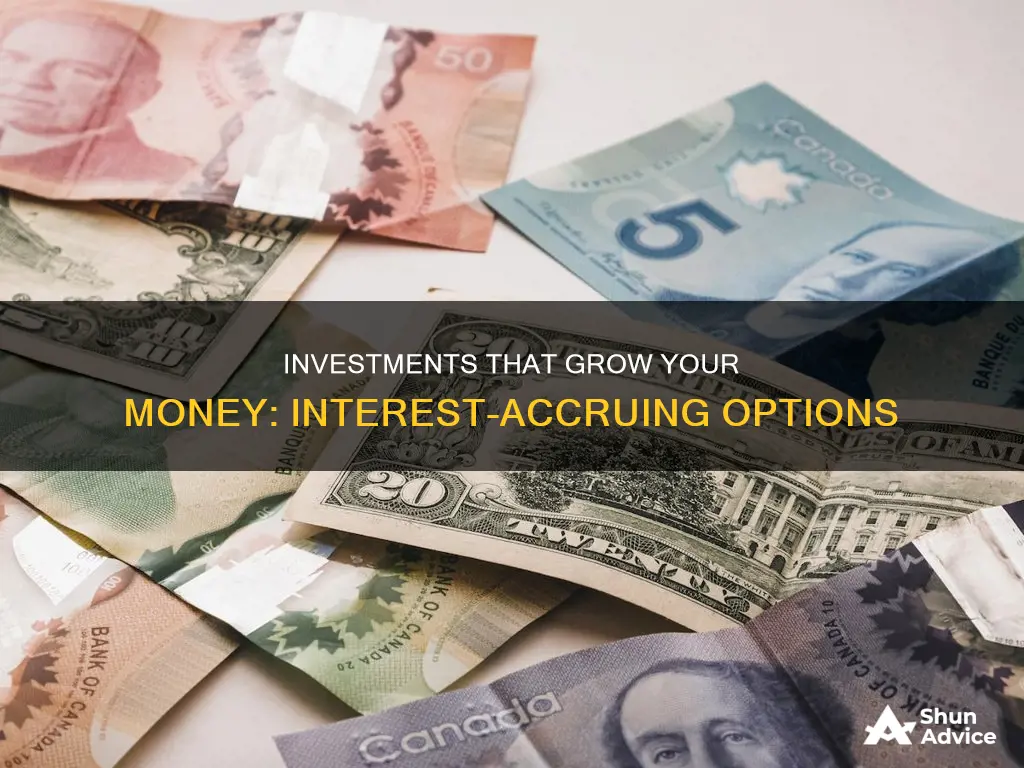
Accrued interest is the interest that builds over time before it is earned or owed. It is important to understand the different types of interest when it comes to investing, as this can help you manage your finances effectively. Accrued interest is interest that an investment is earning but has not yet been collected. This is different from earned interest, which is the rate of interest an investment is earning, and paid interest, which is the interest the investor has received into their account. Accrued interest is relevant to investments such as bonds, which are a type of loan to a company or government.
| Characteristics | Values |
|---|---|
| Definition | Accrued interest is the interest that an investment is earning but has not yet been collected |
| Examples | Bonds, credit cards, mortgages, student loans, savings accounts |
| Calculation | Based on the rate and how much money is saved or invested |
What You'll Learn

Bonds
Accrued interest is the interest that has accumulated since the last time a bond interest payment was made. It is an important consideration when buying or selling investment assets between payment dates. After a bond is transferred to a new owner, the previous owner must be compensated for the period of time for which they owned the bond.
The difference between accrued interest and paid interest is a matter of timing. Accrued interest is the interest that builds over time before it is earned or owed. Once accrued interest becomes available, it is referred to as paid interest. Paid interest is the interest that has been received into the investor's account, at which point interest is no longer accrued.
Understanding the different types of interest is important for managing your finances and investments effectively. When it comes to bonds, accrued interest helps investors see whether they are getting the interest owed. It is also useful for determining the overall performance of an investment.
Interest Expense: Investment Activity or Not?
You may want to see also

Loans
There are different types of loans, such as credit cards, mortgages, and student loans, and the interest rates and terms can vary depending on the type of loan and the lender. It's important to understand the terms and conditions of your loan, including the interest rate and any fees or charges, before you borrow money.
The interest on a loan is typically calculated based on the principal amount borrowed and the interest rate. The interest may be fixed, which means it stays the same for the duration of the loan, or it may be variable, which means it can change over time.
When you make payments on a loan, the money is usually applied first to any accrued interest, and then to the principal amount. This means that even if you make regular payments, the amount of interest you owe may continue to increase if you are not paying off the principal.
It's important to note that loans are a form of debt, and while they can be a useful tool for financing large purchases or projects, it's crucial to borrow responsibly and ensure that you can afford the repayments. Defaulting on a loan can have serious consequences, including damage to your credit score and legal action by the lender.
Investment Interest: Itemized Deduction Strategy for Investors
You may want to see also

Savings accounts
The interest rate on a savings account can vary depending on the bank and the type of savings account you have. Some savings accounts offer a fixed interest rate, which means the interest rate will stay the same for a set period of time. Other savings accounts offer a variable interest rate, which means the interest rate can change over time based on market conditions.
It's important to note that the interest you earn on a savings account is usually taxable. This means that you will need to report the interest income on your tax return and pay taxes on it. However, there are some savings accounts that are tax-free, such as Individual Savings Accounts (ISAs) in the UK.
The amount of interest you can earn on a savings account can also depend on the balance of the account. Some savings accounts have a minimum balance requirement, which means you need to keep a certain amount of money in the account to earn interest. Other savings accounts may offer a higher interest rate if you have a higher balance.
Overall, savings accounts can be a great way to accrue interest and grow your money over time. By shopping around for the best interest rates and considering the tax implications, you can make the most of your savings and reach your financial goals.
Understanding Dividends & Interest in Investment Performance
You may want to see also

Mortgages
Accrued interest is interest that an investment is earning but has not yet been collected. It is important to understand the difference between accrued interest, earned interest and paid interest when it comes to investing. Accrued interest is interest that builds over time before it is earned or owed. Once accrued interest becomes available, it is referred to as regular interest or paid interest.
There are different types of mortgages available, and the interest rate can vary depending on the type of mortgage you choose. For example, with a fixed-rate mortgage, the interest rate stays the same for the duration of the loan. Whereas with a variable-rate mortgage, the interest rate can change over time, which means the amount of interest you accrue can also change.
It is important to understand how interest accrues on a mortgage as it can significantly impact the total cost of the loan. By making regular payments towards the interest, you can reduce the amount of interest that accrues over time. Additionally, some mortgages offer the option to make extra payments towards the principal balance, which can also help to reduce the total interest accrued.
When taking out a mortgage, it is important to consider the interest rate and how it will impact your monthly payments and the overall cost of the loan. By understanding how interest accrues, you can make more informed decisions about your mortgage and potentially save money in the long run.
Negative Interest Rates: Impact on Investments and Your Money
You may want to see also

Student loans
The interest on a student loan begins to accrue as soon as the loan is disbursed. This means that even while you are still in school, interest is building up on the loan. However, many student loans offer a grace period, which is a set amount of time after you graduate or leave school before you have to start making payments. During this grace period, interest may continue to accrue, but you are not yet required to make payments.
The amount of interest that accrues on a student loan can vary depending on several factors, including the principal amount of the loan, the interest rate, and the length of the repayment term. It's important to understand how interest accrues on your student loan, as it can significantly impact the total cost of the loan over time.
Student loan interest is typically calculated using a method called compound interest. This means that interest is not only charged on the principal amount of the loan but also on any accrued interest. As a result, the longer you take to repay the loan, the more interest will accrue, and the higher the total cost of the loan will be.
Investing: My Journey and Interest Explained
You may want to see also
Frequently asked questions
Accrued interest is interest that an investment is earning but has not yet been collected.
Bonds are an example of an investment that accrues interest. When someone purchases a bond, they are loaning money to the government or company they purchased it from. As the bond matures, interest accrues based on the initial investment.
Accrued interest is the amount of bond interest accumulated since the last time a bond interest payment was made. Bond owners are compensated in the form of regular interest payments for the money they have lent.
Interest payments are usually made semi-annually, but ownership of bonds can be transferred between different investors at any time, not just on an interest payment date.
Accrued interest is the interest that builds over time before it’s earned or owed. Earned interest is the rate of interest an investment is earning and can help investors determine an investment’s overall performance.







